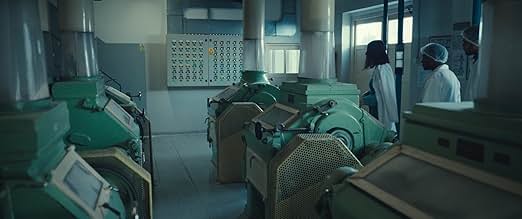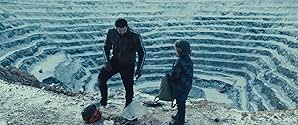NOTE IMDb
7,2/10
6,2 k
MA NOTE
Une analyse sans jugement des moteurs du comportement humain face à l'inconnu, de la façon dont on perçoit l'autre et de son rapport à un futur qui inquiète.Une analyse sans jugement des moteurs du comportement humain face à l'inconnu, de la façon dont on perçoit l'autre et de son rapport à un futur qui inquiète.Une analyse sans jugement des moteurs du comportement humain face à l'inconnu, de la façon dont on perçoit l'autre et de son rapport à un futur qui inquiète.
- Réalisation
- Scénario
- Casting principal
- Récompenses
- 7 victoires et 18 nominations au total
Endre Rácz
- Tibi
- (as Rácz Endre)
Avis à la une
It's been half a decade since Cristian Mungiu's previous film, the excellent Bacalaureat/Graduation, and there's a bit of its thematic DNA in his most recent work. The movie goes beyond that though by exploring a real event which left its mark on Romanian society a few years ago, an event littered with prejudice and xenophobia. R. M. N. Is a bit messy and concludes in an unsatisfying fashion, but rewards the viewer with a layered experience.
From the get-go, there's a coldness to R. M. N. (Romanian abbreviation for Magnetic Resonance Imaging) that you can't shake - it's visual, it's seasonal and it's in the lead character, a monosyllabic bear of a man named Matthias. After an incident occurs while working abroad, he returns home, where more coldness awaits him, as he's met by a distant wife, an emotionally stifled child and a circumspect lover. His home village, set between mountains and forests, stands out by being multiethnic - predominantly Hungarians and Romanians, but also some Germans, like Matthias. The interaction between Mungiu's characters is fascinating to watch, as they transition seamlessly between languages, portraying a well-knit, burgeoning community. It is only after a couple of Sri-Lankan workers arrive to work at the local bakery that the the xenophobe's nest starts stirring.
The movie has a strong build-up, creating a tense atmosphere while setting all its pieces in place. Its characters are faced with more agency than one usual sees, working the underlying beliefs and attitudes onto the screen. And when things turn, they turn quickly and viscously, yet almost unexpectedly - feeding on a sense of unexpressed resentfulness, a feeling primed by our lead's emotional literacy. Similarly to another recent Romanian movie themed around prejudices, Radu Jude's Bad Luck Banging or Loony Porn, R. M. N. Climaxes at a town meeting, where all the paper-thin-arguments you're friendly Facebook neighbour would have shared are laid bare.
To me, this is where the movie wavers. Even as Mungiu tries to maintain a less than judgmental distance from its subjects, there's something so banal and un-cinematic about this kind of stand-off, that it simply cannot carry the burden imposed by the narrative arc. The scene works in spite of this, it works because of the little details and the (un)expected escalation, but it's not a worthy pay-off to what preceded it. And the conclusion that follows it even less so, being close to the absurd in spite of striving for symbolism.
Still, R. M. N. Shouldn't leave you unimpressed. It tackles big themes with passionate interest and concern, which makes up for any shortcomings, thereby proving a worthy addition to Mungiu's impressive catalogue of films.
From the get-go, there's a coldness to R. M. N. (Romanian abbreviation for Magnetic Resonance Imaging) that you can't shake - it's visual, it's seasonal and it's in the lead character, a monosyllabic bear of a man named Matthias. After an incident occurs while working abroad, he returns home, where more coldness awaits him, as he's met by a distant wife, an emotionally stifled child and a circumspect lover. His home village, set between mountains and forests, stands out by being multiethnic - predominantly Hungarians and Romanians, but also some Germans, like Matthias. The interaction between Mungiu's characters is fascinating to watch, as they transition seamlessly between languages, portraying a well-knit, burgeoning community. It is only after a couple of Sri-Lankan workers arrive to work at the local bakery that the the xenophobe's nest starts stirring.
The movie has a strong build-up, creating a tense atmosphere while setting all its pieces in place. Its characters are faced with more agency than one usual sees, working the underlying beliefs and attitudes onto the screen. And when things turn, they turn quickly and viscously, yet almost unexpectedly - feeding on a sense of unexpressed resentfulness, a feeling primed by our lead's emotional literacy. Similarly to another recent Romanian movie themed around prejudices, Radu Jude's Bad Luck Banging or Loony Porn, R. M. N. Climaxes at a town meeting, where all the paper-thin-arguments you're friendly Facebook neighbour would have shared are laid bare.
To me, this is where the movie wavers. Even as Mungiu tries to maintain a less than judgmental distance from its subjects, there's something so banal and un-cinematic about this kind of stand-off, that it simply cannot carry the burden imposed by the narrative arc. The scene works in spite of this, it works because of the little details and the (un)expected escalation, but it's not a worthy pay-off to what preceded it. And the conclusion that follows it even less so, being close to the absurd in spite of striving for symbolism.
Still, R. M. N. Shouldn't leave you unimpressed. It tackles big themes with passionate interest and concern, which makes up for any shortcomings, thereby proving a worthy addition to Mungiu's impressive catalogue of films.
This is not a film for those of us who watch movies casually. If you pay close attention to the gloriously intricate details of this film, the ending will leave you speechless and full of ruminations for days (maybe even weeks) to come.
The characters in this film are not cartoonish one-note ideas -- they're complex full human beings. We have a brilliant anti-hero as our lead, a morally-confused "working woman" type as our second lead, and a village whole as our third lead. Think this sounds boring? Give the film a chance and let it seep in. It's firing on all cylinders - beautiful, moody, dark, socially-relevant without being preachy or preening.
Mungiu is a master and has yet to make a bad movie.
The characters in this film are not cartoonish one-note ideas -- they're complex full human beings. We have a brilliant anti-hero as our lead, a morally-confused "working woman" type as our second lead, and a village whole as our third lead. Think this sounds boring? Give the film a chance and let it seep in. It's firing on all cylinders - beautiful, moody, dark, socially-relevant without being preachy or preening.
Mungiu is a master and has yet to make a bad movie.
Not sure what the message of the movie was supposed to be. There are two separate stories, one with a kid who saw something scary and is not able or willing to speak anymore after it, the second with a couple of immigrant workers who are not welcomed by the locals in the village.
Not much is happening in any of the stories, and definitely nothing that has not been depicted better in other movies.
The end of the movie is really, really confusing, with a woman who is asking forgiveness for something, not clear at all what exactly, then some bear figures hiding in the woods around her house... The movie left me with the sensation that I just wasted two hours that I could have spent in a better way.
Not much is happening in any of the stories, and definitely nothing that has not been depicted better in other movies.
The end of the movie is really, really confusing, with a woman who is asking forgiveness for something, not clear at all what exactly, then some bear figures hiding in the woods around her house... The movie left me with the sensation that I just wasted two hours that I could have spent in a better way.
The director as usual deals with gray areas of morality. No one is all good or bad. All characters - with all their qualities and vices - are simply put, human.
He is able to treat topics such as immigration, racism, east-west, identity politics, etc. Without falling into the trap of being judgmental or prescriptive. No slogans here. All issues depicted naturally through the normal flow of normal people's lives...
The single take in the town hall - which goes on for minutes - must be a milestone in film history! I cannot imagine how many takes he must have had to create this virtually impossible scene. In a single take, so many characters engaging in the liveliest dialogue for minutes...it was breathtaking.
R. M. N. Was 2 hours of a visual and dramatic feast. I cannot wait to see what this great director will produce for us next.
He is able to treat topics such as immigration, racism, east-west, identity politics, etc. Without falling into the trap of being judgmental or prescriptive. No slogans here. All issues depicted naturally through the normal flow of normal people's lives...
The single take in the town hall - which goes on for minutes - must be a milestone in film history! I cannot imagine how many takes he must have had to create this virtually impossible scene. In a single take, so many characters engaging in the liveliest dialogue for minutes...it was breathtaking.
R. M. N. Was 2 hours of a visual and dramatic feast. I cannot wait to see what this great director will produce for us next.
It's doubtful that anyone who's not Romanian -- and possibly Hungarian? -- will understand the title of this movie without looking it up on the Internet, as I did. And even after you do, you still might not completely understand why Cristian Mungiu decided to name it that. R. M. N. Is essentially the Romanian version of M. R. I, and while a brain scan makes a literal appearance in the film, it's done on a minor character, and what in the world does that have to do with everything else going on anyway?
But Mungiu has said that the idea of a brain scan, of peering underneath what's visible to see the inner workings of the mind, is a suitable metaphor what this film does to its characters. The movie is full of people who have thoughts and opinions and prejudices roiling underneath the exteriors they choose to present to the world, and it only takes the right combination of circumstances for all of those thoughts and feelings to ignite into a conflagration.
The major set piece of "R. M. N" is a town meeting done in one static long take. Here, the townspeople, presided over by their mayor, debate whether or not to let three Sri Lankan workers stay in the town and work at the local bakery. Xenophobia rears its ugly head, and civil discourse doesn't have a chance. Even though folks arguing on both sides of the argument make valid points, no one is interested in hearing anything anyone else is saying. Fear and irrationality reign supreme.
That same fear and irrationality bleeds into the film's enigmatic and deeply unsettling ending. You could spend a couple of hours with other people who've seen the movie debating what it all means, and still not be confident that you know. But it's effective as hell.
I'm sitting here thinking about this movie the day after I saw it, and I can't get it out of my mind.
Grade: A.
But Mungiu has said that the idea of a brain scan, of peering underneath what's visible to see the inner workings of the mind, is a suitable metaphor what this film does to its characters. The movie is full of people who have thoughts and opinions and prejudices roiling underneath the exteriors they choose to present to the world, and it only takes the right combination of circumstances for all of those thoughts and feelings to ignite into a conflagration.
The major set piece of "R. M. N" is a town meeting done in one static long take. Here, the townspeople, presided over by their mayor, debate whether or not to let three Sri Lankan workers stay in the town and work at the local bakery. Xenophobia rears its ugly head, and civil discourse doesn't have a chance. Even though folks arguing on both sides of the argument make valid points, no one is interested in hearing anything anyone else is saying. Fear and irrationality reign supreme.
That same fear and irrationality bleeds into the film's enigmatic and deeply unsettling ending. You could spend a couple of hours with other people who've seen the movie debating what it all means, and still not be confident that you know. But it's effective as hell.
I'm sitting here thinking about this movie the day after I saw it, and I can't get it out of my mind.
Grade: A.
Le saviez-vous
- AnecdotesMungiu named the film after a Romanian acronym for -nuclear magnetic resonance-, as the film is "an investigation of the brain, a brain scan trying to detect things below the surface".
- Bandes originalesYumenji's Theme
Composed by Shigeru Umebayashi for In the Mood for Love (2000)
Meilleurs choix
Connectez-vous pour évaluer et suivre la liste de favoris afin de recevoir des recommandations personnalisées
- How long is R.M.N.?Alimenté par Alexa
Détails
Box-office
- Montant brut aux États-Unis et au Canada
- 46 360 $US
- Week-end de sortie aux États-Unis et au Canada
- 6 121 $US
- 30 avr. 2023
- Montant brut mondial
- 738 520 $US
- Durée2 heures 5 minutes
- Couleur
- Rapport de forme
- 2.39 : 1
Contribuer à cette page
Suggérer une modification ou ajouter du contenu manquant
























